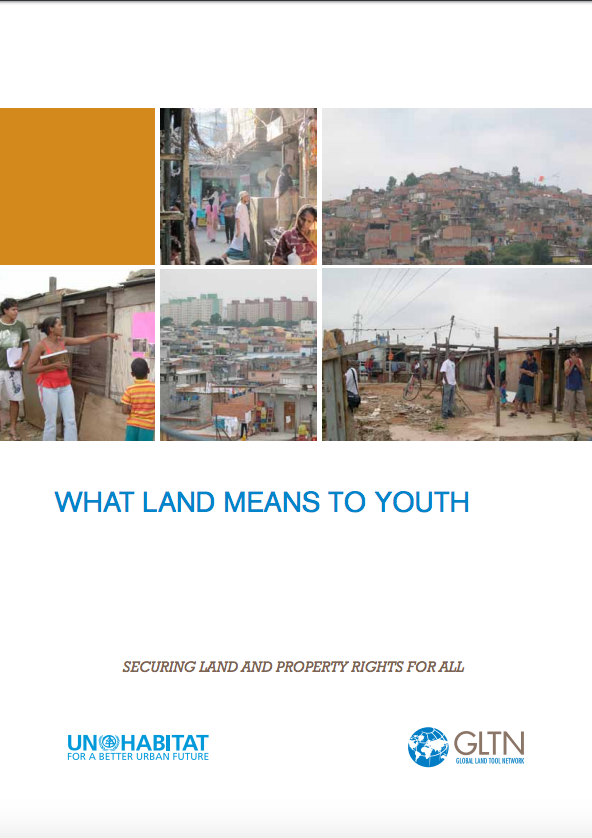Focal point
Location
The Global Land Tool Network (GLTN) is an alliance of global regional and national partners contributing to poverty alleviation through land reform, improved land management and security of tenure particularly through the development and dissemination of pro-poor and gender-sensitive land tools.
Secure land tenure and property rights are fundamental to shelter and livelihoods as well as the realisation of human rights, poverty reduction,economic prosperity and sustainable development.
The Global Land Tool Network (GLTN) main objective therefore is to contribute to poverty alleviation and the Millennium Development Goals through land reform, improved land management and security of tenure.
UN-Habitat through GLTN continues to work towards this with partners who include international civil society organizations, international finance institutions, international research and training institutions, donors and professional bodies.
Most developing countries use conventional land administration systems which cover less than 30 per cent of the country, leaving up to 70 per cent of citizens looking to informal and/ or customary approaches for their tenure security.
While there are many examples of good land policies, there are few policies that have been fully implemented due to lack of pro-poor, gendersensitive and largescale land tools. Further, conventional land titling approaches have largely failed to deliver their expected results since existing technical solutions are too expensive, inappropriate for the range of tenure found in developing countries, unsustainable financially or in terms of available capacity, and instead a range of land tenure options is more appropriate.
Core Values
Consequently, GLTN's core values and principles are founded in the development of land tools that are:
- Pro poor;
- Equitable;
- Sustainable;
- Affordable;
- Systematically large scale /scalable; and,
- Gender-sensitive, while taking into consideration:
- Good governance;
- Subsidiarity; and,
- The Continuum of Land Rights.
GLTN Objectives and Mandate
GLTN has developed a global partnership on land issues pulling together global partners, as well as many individual members. These partners include international networks of civil society, International Finance Institutions, international research and training institutions, donors and professional bodies. It continues to take a more holistic approach to land issues by working towards the following objectives:
- The establishment of a continuum of land rights, rather than just focus on individual land titling
- Improving and developing pro-poor land management, as well as land tenure tools
- Unblocking existing initiatives Assisting in strengthening existing land networks
- Supporting in the development of gendered land tools which are affordable and useful to grassroots
- Improving the general dissemination of knowledge about how to improve security of tenure
- Improving the general knowledge dissemination on the improvement of security of tenure
Resources
Displaying 226 - 230 of 286Training Package Toolkit: Tools to support Transparency in Land Administration
This publication forms a part of a two volume training package on Tools to Improve Transparency in Land Administration. The training package comprises a Training Toolkit and a Trainers' Guide. The first provides content and the latter training methods. The publication is a product of a series of training workshops implemented across Sub-Sahara Africa, South and South East Asia. Under the leadership of the GLTN/UN-Habitat, the training brought together six universities from the global South and one from Europe.
What Land Means to Youth
In order to build on the momentum and to be able to move from individuals action to change towards a youth responsive land sector at scale, there is a need to strengthen the knowledge base and to broaden the understanding of how youth’s land rights and needs are intricately linked to sustainable development in rural and urban areas.
Training Package Trainers Guide: Tools to support Transparency in Land Administration
This publication forms a part of a two volume training package on Tools to Improve Transparency in Land Administration. The training package comprises a Training Toolkit and a Trainers' Guide. The first provides content and the latter training methods. The publication is a product of a series of training workshops implemented across Sub-Sahara Africa, South and South East Asia. Under the leadership of the GLTN/UN-Habitat, the training brought together six universities from the global South and one from Europe.
Land tenure security in selected countries: Synthesis report
In this synthesis report, the issue of tenure security is addressed and assessed in several countries where government, civil society, the private sector and development cooperation initiatives have been implemented for decades. The selected case studies from fifteen (15) countries ensure not only a geographic balance but they also represent countries with different socio-economic and land-related histories and that have followed different pathways. The studies’ key findings underline the still precarious state of tenure security in many countries.
Managing urban land: a guide for municipal practitioners
Urban land markets have a profound effect on how well poor households are able to access the jobs, amenities and services offered in the city. But often the way in which this market works frustrate attempts to open up better located living and business opportunities for poorer urban households and communities, despite government policies and programmes intended to address these challenges. The challenge in South Africa is even larger because of worsening poverty and inequality, and the continuing growth of cities through urbanisation.









